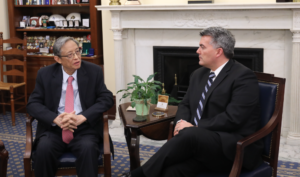
The United States continues to stand firmly in support of its democratic ally Taiwan, U.S. Sen. Cory Gardner (R-CO) told Chinese diplomats last week.
Sen. Gardner, chairman of the U.S. Senate Foreign Relations Subcommittee on East Asia, the Pacific, and International Cybersecurity Policy, on Feb. 12 met with a diplomatic delegation from the People’s Republic of China (PRC) led by former Ambassador to the United States Wenzhong Zhou.
“We discussed actions mandated by my Asia Reassurance Initiative Act, including those concerning Taiwan,” the senator confirmed after the meeting. “I reiterated that Beijing’s hostile actions toward Taipei are counterproductive and the United States Congress will continue to advocate on behalf of Taiwan and the Taiwanese people.”
Congress, he said, is guided to do so by United States law, including the Taiwan Relations Act (TRA), the Taiwan Travel Act, and the Asia Reassurance Initiative Act (ARIA).
Sen. Gardner also said he explained to the Chinese delegates why he and several other senators recently urged U.S. House Speaker Nancy Pelosi to invite Taiwan President Tsai Ing-wen to address Congress.
Sen. Gardner led four other lawmakers in signing a Feb. 7 letter sent to Pelosi requesting she “favorably consider” such an invite in light of the fact that the PRC “has continued to escalate its rhetoric and actions that threaten Taiwan’s democracy and sovereignty.”
Since the May 2016 inauguration of President Tsai, five nations have withdrawn diplomatic recognition from Taiwan due to pressure from Beijing, the lawmakers wrote, adding that since the TRA went into effect, “Congress has expressed near-unanimous bipartisan support for Taiwan, including encouraging high-level leader visits between Taiwan and the United States.”
In fact, most recently, the Taiwan Travel Act, which became law in March 2018, explicitly allows “high-level officials of Taiwan to enter the United States, under conditions which demonstrate appropriate respect for the dignity of such officials, and to meet with officials of the United States.” The ARIA, signed into law on Dec. 31, 2018, re-affirmed that act’s provisions, they wrote.
“While we understand that the honor of addressing a joint address to Congress is generally reserved for recognized heads of state, there is also clear precedent for inviting prominent democratic leaders,” according to their letter.
Sen. Gardner and his colleagues wrote that an invite to Taiwan President Tsai, who they consider a genuine democratic leader engaged in a struggle against an authoritarian and oppressive system, “would send a powerful message that the United States and the American people will always stand with the oppressed, and never the oppressor.”
“It is my hope that Speaker Pelosi issues such an invitation in the near future,” Gardner said last week.
Also during his meeting with Chinese diplomats, Sen. Gardner shared his views “regarding the dangers of China’s illegal militarization of the South China Sea, along with the worsening of human rights and discriminatory trade behaviors by Beijing.”
The senator said he expressed the hope that the United States and the PRC might “peacefully resolve these issues.”
“I made it clear to Ambassador Zhou that I will continue to be a voice for America’s priorities in the region, and I welcome future conversations between our two countries,” he said.
Last week’s meeting is a follow up to one Sen. Gardner held In December 2018 with Cui Tiankai, China’s current ambassador to the United States.
During the previous meeting, Sen. Gardner told Tiankai that while the United States has always preferred having “cordial and constructive ties with China,” the country’s behavior in recent years “has fallen outside of international norms and now threatens to upend the U.S.-led liberal world order that resulted in decades of peace and prosperity in the Indo-Pacific.”
Sen. Gardner at that time also told the ambassador that the United States “expects China to take additional steps to achieve complete, verifiable, irreversible denuclearization of North Korea.”



